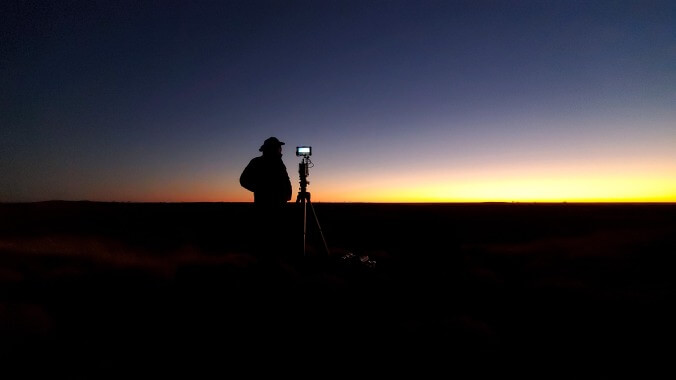Werner Herzog chases meteorites and those who love them in Fireball: Visitors From Darker Worlds

Almost every interview subject in Werner Herzog’s latest documentary gets introduced with a prolonged, silent close-up that’s held for an uncomfortably long time. The people being filmed are usually smiling, but they still look slightly anxious, as if uncertain of what’s expected of them; few non-actors know quite what to do when asked to stare into a camera lens for ages (which is why 19th-century portraits, which required very lengthy exposure, look so stilted). Herzog has sometimes used this technique strategically, in what’s seemed like a deliberate attempt to create a sense of unease. That’s not what’s happening here, though. He just wants us to admire these folks—scientists, mostly—as much as he does. Fireball: Visitors From Darker Worlds ostensibly explores the world of meteorites, from the small rock that smashed through an Alabama woman’s roof in 1954, badly bruising her on one hip, to the gigantic bolide that killed every non-avian dinosaur some 66 million years ago. The film’s true focus, however, is those who love meteorites and are excited to share that passion, their ardor burning as brightly as those streaks through the sky.
Interestingly, that description doesn’t really fit Herzog’s creative partner, Clive Oppenheimer, who previously appeared in both Encounters At The End Of The World and Into The Inferno. The two share director credit here, and Oppenheimer conducts all of the on-camera interviews, with Herzog piping in via his trademark voiceover narration. This isn’t Oppenheimer’s field, though—he’s a vulcanologist—so while he comes across throughout as curious and fascinated, he’s basically just a proxy for Herzog (one who’s less inclined to ask bizarre questions). As in Inferno, they travel around the world, wherever objects from space have made it through Earth’s atmosphere and impacted the ground, which is everywhere. We meet Norway’s most renowned jazz guitarist, Jon Larsen, whose hobby is finding micrometeorites on a particular sloped rooftop and having a buddy photograph their beauty when magnified thousands of times. A Jesuit astronomer at the Vatican Observatory, who boasts a middle-aged Mandy Patinkin vibe, excitedly waxes philosophical about the sheer awe that fuels both science and faith. Herzog even admits that they contacted a Korean team in Antarctica—where literally every rock found on the ice sheet is of extraterrestrial origin—specifically because he loved one guy’s giddy enthusiasm in a video he’d seen.
The downside of this freewheeling, decidedly unsystematic approach is that you don’t actually learn that much. Brother Consolmagno, the Jesuit, doesn’t impart any specific knowledge about meteorites, for example—it’s his personality that Herzog finds interesting. There’s even some potential misinformation here: Though he can’t personally visit the Kaaba, because neither he nor Oppenheimer is Muslim, Herzog includes some smartphone footage of people venerating the Black Stone (a relic since at least the 7th century), claiming that it’s almost certainly a meteorite. No scientific analysis of the stone has ever been permitted, however, and its Wikipedia entry notes that “the meteoric hypothesis is viewed by geologists as doubtful.” Herzog could easily have learned that (very likely did, in fact), but he’s never been inclined to let boring old facts get in the way of a good story.
Anyway, if it’s strictly information that you want, that’s what the Discovery Channel is for. The pleasures of a Herzog doc are unique to him, as when one scientist says “Now I should warn you” and Herzog’s voiceover immediately leaps in: “The warning was justified. Yes, indeed, it gets so complicated now that we are not going to torture you with details.” The dour Bavarian highlight comes in Chicxulub, Mexican home of the impact crater from the dinosaur-killing bolide; Fireball shows stray dogs wandering the region, as Herzog complains that these forlorn mutts, like all dogs everywhere, are too dimwitted (actual insult!) to know what happened at that location long before the dawn of man. There’s the darker world we sought.